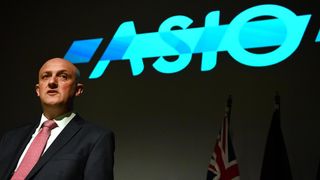Last week Australia’s spy boss sent ripples through the national security community with the announcement that Asio will shift from using “rightwing extremism” and “Islamic extremism” to using “ideological extremism” and “religious extremism”. In his second annual threat assessment, director general Mike Burgess told a Canberra audience that “words matter”, and the old words were no longer fit for purpose.
Words do matter. Burgess’ words in his first public address in 2020 which took aim at the extreme right wing, were lightning bolts in Australia’s post-Christchurch discourse. The organisation’s disclosure that 30-40% of its caseload was associated with these issues gave invaluable context to a public debate that was severely lacking.
While the quick pivot away from these terms took many by surprise, it has not happened in a vacuum. The change is similar to one undertaken by the Canadian Security Intelligence Service in 2020. Far from signalling the diminishing resolve of the country, Canada took the bold step of listing The Proud Boys on its terror register in February. Likewise, the US Office of the Director of National Intelligence published an unclassified memo dated 1 March 2021 which contained similar rhetorical shifts throughout. The memo, which warns more “racially motivated extremist attacks” will “almost certainly” take place in 2021, was in the process of being released to the public when a gunman shot and killed eight Asian Americans in Atlanta.
But as the director general acknowledges, Asio doesn’t control or seek to control the way Australia’s leaders in politics and the media discuss these issues and this is where rhetoric plays its most important role.
Following this year’s address, Burgess told Guardian Australia that political pressure did not factor in the organisation’s decision process. But as the director general acknowledges, the organisation doesn’t control or seek to control the way Australia’s leaders in politics and the media discuss these issues and this is where rhetoric plays its most important role.
But politics has played a visible role in this conversation. In 2020, Senator Concetta Fierravanti-Wells said in response to the phrase “rightwing extremism” that “there are many people of conservative background who take exception with being charred with the same brush”. Nonetheless, the clear content of Asio’s public communication in 2020 set a foundation for an inquiry into extremism and radicalisation currently before Australia’s Parliamentary Joint Committee on Intelligence and Security. The proposed inquiry had a focus on the extreme-right, but that suggestion touched another third rail which led to the inquiry eventually focusing on extremism in general, which is still a worthwhile endeavour.
When a bill condemning extremism was put to the Senate in February, it was amended to remove references to the extreme right and to first note that Australia is one of the most successful multicultural countries on Earth.
Australia’s success in multiculturalism is an enduring notion that should not be taken for granted in the face of multicultural Australia’s lived experience: The Lowy Institute this month reported that in the context of the pandemic, one in five Chinese Australians have been physically threatened or attacked because of their heritage. Last week, a study from Charles Sturt University revealed that 58% of mosques in Australia had their worshippers or building experience targeted violence between 2014 and 2019, when the Christchurch attack occurred. In February, the Scanlon Foundation found 37% of Australians indicate a negative view towards those who follow Islam.
For many in Australia’s Muslim community, Asio’s shifting signal comes after two painful decades where many of our leaders and influential commentators have taken every opportunity to declare that they were not afraid to take on Islamic extremism or Islamists. They told us we have to call it out for what it is. And they demanded impossible feats of our country’s Muslim community leaders. Leaders like Labor MP Ed Husic who last week recalled constantly being asked to condemn Islamic extremism “louder, stronger, and more regularly”. Those mechanisms of Australian political discourse have been set at a constant hum and ratcheted up to a roar in the wake of almost every terror incident.
Regardless of exactly where, when, or how the Australian Christchurch shooter was radicalised, the influence of Australia’s damaging discourse about Islam and immigration has been inescapable for too long.
A fortnight ago, the UN Special Rapporteur on freedom of religion or belief again outlined how these kinds of responses have securitised the global Muslim community and have created an imagined construct that has been used to justify hostility and violence. This construct has been central to the foundation on which many strains of ideological extremism in Australia rest. Regardless of exactly where, when, or how the Australian Christchurch shooter was radicalised, the influence of Australia’s damaging discourse about Islam and immigration has been inescapable for too long.
Quite simply, the offence a conservative Australian could take in response to the use of the phrase “rightwing extremism” pales in comparison to the damage Australian rhetoric has already wrought on our minority communities.
With this in mind, if this change gives leaders the political cover they think they need to take these emerging trends seriously, then it should be embraced. Any subsequent failure to confront ideological extremism front-on will demonstrate the extent to which stated political sensitives are a thin veil for a much uglier cultural problem that denies the possibility for threats to the Australian “way of life” to come from within it. The costs of continuing to equivocate over the very existence of ideological extremism will escalate, and rapidly.
Australia only has to look to the way the United States let these forces seep and then surge through its halls of power to understand the urgency at hand.
But while this moment demands action, it also calls for an act of self-reflection; to acknowledge the way language itself helped give rise to the forces that would gleefully rip Australia’s multicultural social fabric to shreds.






